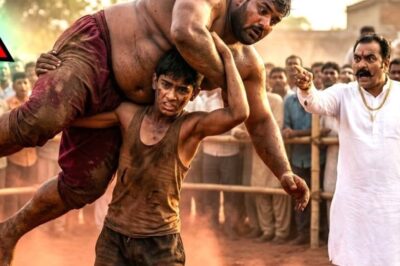Devoleena Bhattacharjee Revealed Shocking Truth on her 7 Month Old Son called Tarrorist being Muslim
.
.
.
Devoleena Bhattacharjee Shuts Down Trolls Targeting Her 7-Month-Old Son: A Stand Against Online Hate
In the age of social media, celebrities often share glimpses of their personal lives with their fans, celebrating milestones and cherishing precious moments. However, this openness can sometimes make them and their families targets of unwarranted negativity and hate. Recently, popular Indian television actress Devoleena Bhattacharjee faced such a situation when she shared an adorable photo of her seven-month-old son, Joy, on Instagram. What should have been a heartwarming moment was marred by a wave of insensitive and hateful comments, with trolls targeting the baby’s skin color and religion. Devoleena’s courageous response to these trolls has sparked an important conversation about racism, religious intolerance, and the responsibilities of public figures in confronting such issues.
The Incident: Trolls Attack a Child
A few days ago, Devoleena Bhattacharjee posted a sweet picture of her seven-month-old son, Joy, to mark a special milestone in his life. Instead of receiving the love and warmth that such a post typically attracts, the comment section was soon flooded with negativity. Trolls left a barrage of insensitive remarks, most of them targeting the baby’s skin tone and, shockingly, his religious background.
Some of the comments were deeply hurtful. One user wrote, “Your son doesn’t even look like you,” while another commented, “Looks like he takes after his father.” Others went further, suggesting, “Apply fair skin cream on such kids,” and one even remarked, “Looks like you picked up a laborer’s child.” The most disturbing were comments that labeled the child a “terrorist” because he is Muslim, exposing the ugly side of social media where even innocent children are not spared from hate.
Devoleena’s Powerful Clapback
Rather than ignore the hate or suffer in silence, Devoleena Bhattacharjee decided to take a stand. She took screenshots of the offensive comments and the users’ profiles and reposted them on her Instagram stories, directly calling out each troll and giving them a piece of her mind. In doing so, she sent a strong message that such behavior would not go unchecked.
In one of her stories, Devoleena urged others to be conscious of the people around them who harbor such toxic mentalities, especially if they are close to them. She wrote, “This is your so-called musician. May God protect all real musicians from people like this, and may many dogs stay safe too. These people refuse to let others be, but shamelessly spread their filthy mentality on others’ posts.”
Devoleena’s decision to confront the trolls head-on resonated with many, especially those who have faced similar online abuse. By exposing the trolls and refusing to let their comments slide, she set an example for others on how to respond to hate with courage and dignity.
The Context: Devoleena’s Family and Background
For those unaware, Devoleena met her husband, Shahnavaz Sheikh, a fitness trainer, at a gym in 2018. Their interfaith marriage had already attracted attention, and the couple has been subjected to scrutiny and prejudice from certain sections of society. The recent attack on their son is a continuation of this bigotry, highlighting the persistent issues of racism and religious intolerance in Indian society.
Despite the negativity, Devoleena and Shahnavaz have built a loving family and have been open about their journey, sharing their happiness with fans and supporters. The birth of their son, Joy, was a much-celebrated event, and the couple has often posted about the joys and challenges of parenthood.

The Larger Issue: Racism and Religious Intolerance in India
The incident involving Devoleena’s son is not an isolated one. In recent years, there has been a disturbing rise in online hate targeting individuals based on their skin color, religion, or other personal attributes. Social media platforms, while providing a space for connection and expression, have also become breeding grounds for bigotry and prejudice.
Colorism, or discrimination based on skin color, is a deeply entrenched issue in Indian society. Fair skin has long been associated with beauty and success, a bias perpetuated by media, advertising, and even matrimonial columns. Children, especially those born to celebrities, are often subjected to harsh scrutiny over their appearance, with trolls making derogatory remarks about their complexion.
Religious intolerance is another pervasive problem. Interfaith couples frequently face backlash, and their children are sometimes targeted with hateful labels and stereotypes. The use of terms like “terrorist” to describe a child based solely on his religion is not only offensive but also dangerous, as it perpetuates harmful narratives and divides communities.
The Role of Celebrities in Challenging Hate
Devoleena’s response to the trolls has reignited the debate about how public figures should deal with online abuse. Some argue that celebrities should simply ignore the hate, as responding only gives trolls the attention they crave. Others, however, believe that calling out such behavior is essential in order to challenge and change societal attitudes.
By publicly exposing the trolls and their comments, Devoleena has used her platform to highlight the prevalence of racism and religious intolerance. Her actions have encouraged others to speak up against hate and support those who face discrimination. In a society where silence often enables bigotry, her decision to confront the issue head-on is both brave and necessary.
The Importance of Support and Solidarity
Following Devoleena’s posts, many fans and fellow celebrities came out in support of her and her family. Messages of solidarity flooded her social media, with people condemning the trolls and praising Devoleena for her courage. Some shared their own experiences of facing discrimination, while others called for stricter action against online abuse.
This wave of support underscores the importance of community in combating hate. When victims of abuse know they are not alone, it empowers them to stand up for themselves and others. Solidarity also sends a message to trolls that their behavior is unacceptable and will not be tolerated.
Social Media Platforms and Their Responsibility
The incident also raises questions about the role of social media platforms in addressing online abuse. While platforms like Instagram have mechanisms for reporting and blocking abusive users, many argue that these measures are insufficient. Trolls often create new accounts after being banned, and the sheer volume of abuse makes it difficult for platforms to police every comment.
There is a growing call for social media companies to take stronger action against hate speech, including stricter verification processes, faster response times for reported abuse, and greater accountability for users who engage in harassment. Ultimately, creating a safer online environment requires the combined efforts of platforms, users, and society as a whole.
Lessons Learned: Raising Awareness and Promoting Empathy
Devoleena’s experience serves as a powerful reminder of the need to raise awareness about the impact of online hate and the importance of empathy. It is crucial to educate people, especially the younger generation, about the consequences of their words and actions online. Schools, parents, and community leaders all have a role to play in fostering a culture of respect and understanding.
Empathy is key to combating hate. When people put themselves in others’ shoes and consider how their words might affect someone, they are less likely to engage in hurtful behavior. Promoting empathy and kindness, both online and offline, can go a long way in building a more inclusive and compassionate society.
Moving Forward: Devoleena’s Message
In the wake of the incident, Devoleena has continued to advocate for positivity and resilience. She has encouraged her followers to focus on the good in life and to stand up against injustice wherever they see it. Her message is clear: hate has no place in society, and it is everyone’s responsibility to challenge it.
Devoleena’s decision to confront the trolls, rather than remain silent, is a testament to her strength and commitment to creating a better world for her son and for future generations. Her actions have inspired many to speak out against discrimination and to support those who are targeted by hate.
Conclusion
The incident involving Devoleena Bhattacharjee and her son is a stark reminder of the challenges that come with being in the public eye, especially in the age of social media. It also highlights the persistent issues of colorism and religious intolerance that continue to plague society. However, it is also a story of courage, resilience, and the power of standing up for what is right.
By exposing the trolls and refusing to let their hate go unchallenged, Devoleena has set an example for others to follow. Her actions have sparked an important conversation about the need to confront online abuse and to support those who are targeted by it. As society continues to grapple with these issues, it is essential to remember that change begins with each one of us—by choosing empathy over hate, and by standing up for those who cannot stand up for themselves.
As Devoleena herself said, “This is just the beginning. I haven’t exposed you from top to bottom yet. If you want to challenge me, be prepared for the consequences.” Her words are a powerful reminder that silence is not an option in the face of hate, and that every voice raised against injustice makes a difference.
play video:
News
8 साल बाद ट्रेन में मिली तलाकशुदा IPS पत्नी, फिर जो हुआ उसने सब बदल दिया… | Emotional Story
8 साल बाद ट्रेन में मिली तलाकशुदा IPS पत्नी, फिर जो हुआ उसने सब बदल दिया… | Emotional Story ….
जिस बच्चे को सब भिखारी समझ रहे थे… 😱 उसी ने दंगल में पहलवान को हराकर जीत लिया ₹10 करोड़!
जिस बच्चे को सब भिखारी समझ रहे थे… 😱 उसी ने दंगल में पहलवान को हराकर जीत लिया ₹10 करोड़!…
कूड़ा बीनने वाले लड़के ने भूखे साधु को खिलाई आख़िरी रोटी… सच जानकर अमीर आदमी शर्म से झुक गए
कूड़ा बीनने वाले लड़के ने भूखे साधु को खिलाई आख़िरी रोटी… सच जानकर अमीर आदमी शर्म से झुक गए ….
करोड़पति के बच्ची के सामने खड़ा था एक कूड़ा बीनने वाला लड़का फिर जो हुआ उसने सबको रुला दिया 😢
करोड़पति के बच्ची के सामने खड़ा था एक कूड़ा बीनने वाला लड़का फिर जो हुआ उसने सबको रुला दिया 😢…
तलाकशुदा IPS मैडम दिल्ली घूमने पहुंची, इंडिया गेट के पास उनका पति पानीपुरी बेचता मिला, फिर जो हुआ…
तलाकशुदा IPS मैडम दिल्ली घूमने पहुंची, इंडिया गेट के पास उनका पति पानीपुरी बेचता मिला, फिर जो हुआ… . ….
Kılık Değiştiren Başkomiser, Rüşvetçi Polisleri Tek Başına Bitirdi! O TOKAT Her Şeyi Başlattı!
Kılık Değiştiren Başkomiser, Rüşvetçi Polisleri Tek Başına Bitirdi! O TOKAT Her Şeyi Başlattı! . . . Kılık Değiştiren Başkomiser, Rüşvetçi…
End of content
No more pages to load













